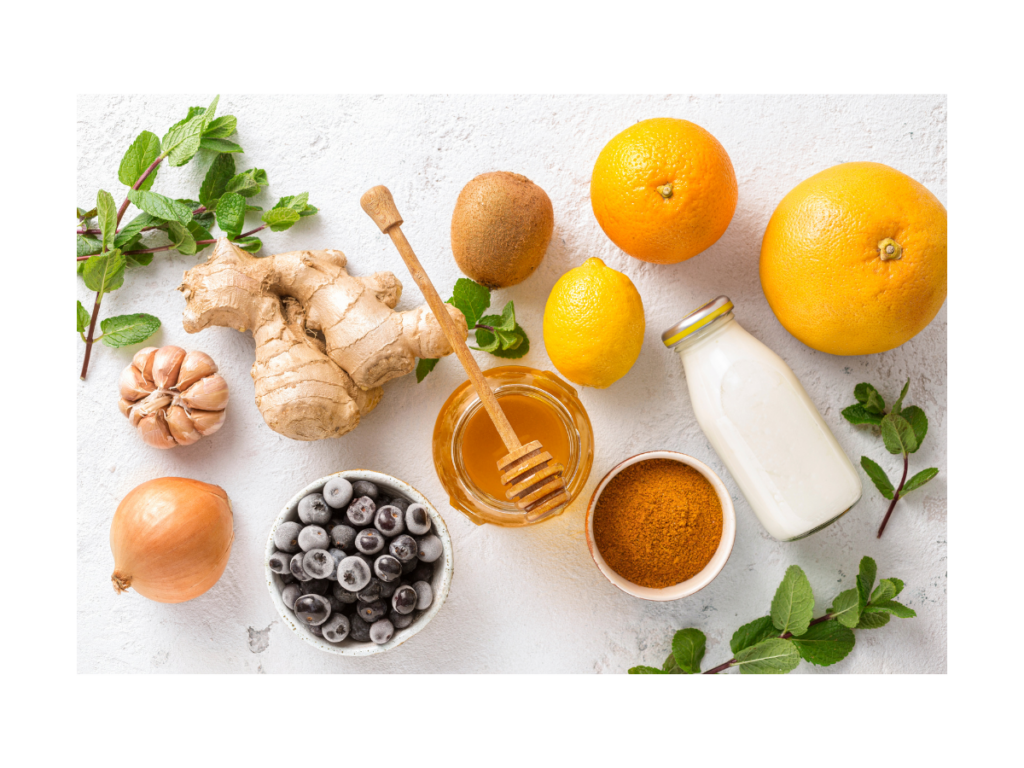
As the days grow shorter and colder, maintaining your health can feel more challenging. Winter brings unique obstacles to our well-being, such as reduced sunlight, seasonal illnesses, and a tendency to indulge in comfort foods. By focusing on proper nutrition, quality sleep, and strategic supplementation, you can thrive even during the chilliest months.
Nutrition: Nourishing, Immune-Supportive Foods For Wellness
A balanced diet is one of the most powerful tools to keep your immune system thriving.
Winter may limit access to fresh, local produce, but frozen fruits and vegetables are excellent alternatives. They’re often frozen at peak ripeness, and this maximizes retention of their nutrients. Aim for a colorful blend of various vegetables- a diet packed with both starchy and non-starchy vegetables is your ultimate defense against colds, flu, and other illnesses because vegetables fuel your body with powerful phytonutrients, antioxidants, vitamins and minerals that keep you healthy and strong! Support your immune system even further by adding lean proteins, healthy fats, and probiotic-rich foods for a well-rounded, immune-supporting meal plan.
Combine flavorful spices like thyme and turmeric with onions, garlic, and vegetables in nourishing broth-based soups and stews. This combination delivers a rich dose of vitamins, minerals, phytonutrients, and prebiotics to fuel the healthy bacteria in your gut.

Here are some of my favorite immune-supporting foods to have on hand during the winter months:
- Citrus Fruits: Oranges, grapefruits, kiwi and lemons are rich in vitamin C, which helps stimulate the production of white blood cells.
- Leafy Greens: Spinach and kale are packed with vitamins A and C, as well as antioxidants.
- Garlic: Known for its immune-boosting properties, garlic contains compounds that may help fight infections.
- Yogurt: Rich in probiotics, yogurt supports gut health, which is closely linked to immune function.
- Nuts and Seeds: Almonds, sunflower seeds, and walnuts provide vitamin E and healthy fats to enhance your body’s defense system.
- Ginger and Turmeric: These spices have anti-inflammatory properties that can help strengthen immunity.
- Bone Broth: This can be used as a base for nourishing soups.
Sleep: The Foundation For Winter Wellness
Prioritize quality sleep, aiming for 7-9 hours of sleep each night for adults and more for children. To regulate your circadian rhythm, keep a consistent bedtime and wake-up schedule, even on the weekends. A well-rested body is better able to fight off illness!

Create a Cozy Sleep Environment
- Lower the thermostat slightly; cooler temperatures help signal your body it’s time to rest.
- Use blackout curtains to block light and mimic the dark winter nights.
- Create a peaceful, comforting bedtime routine.
- Put away screens at least two hours before bedtime.
Combat the “Winter Blues”
Seasonal Affective Disorder (SAD) can disrupt sleep. Consider a light therapy box in the morning to improve your mood and sleep quality for the next night.
Vitamins: Strategic Supplementation
Multivitamin
Take a good quality multivitamin daily for overall immune support. A high-quality multivitamin can provide essential nutrients like vitamin D, which strengthens immune cells, vitamin C to promote antibody production, and zinc to help combat infections. These nutrients work together to fill gaps in your diet, fortify your immune defenses, and keep your body resilient throughout the season.
Vitamin D
Even with a multivitamin that includes vitamin D, most people benefit from taking an extra dose of D as a separate supplement. With reduced sunlight exposure, supplementing vitamin D is essential for immune health, bone strength, and mood stabilization. Check with your doctor or dietitian for the correct dosage, as needs vary by individual.
Vitamin C
While it’s not a cure-all for colds, vitamin C can support your immune system. Begin taking a C supplement at the first signs of sickness or if you know you’ve been exposed to someone who is sick.
Zinc
Zinc is a powerful mineral that helps your body fight infections. While it’s naturally found in foods like oysters, beef, and pumpkin seeds, supplements can be useful if your intake is low. However, it’s important not to overdo it—most people don’t need extra zinc beyond what’s in a good multivitamin. Instead, consider taking zinc along with vitamin C at the first sign of illness or after exposure to colds, flu, COVID, or other contagious illnesses.
Probiotics
Since the majority of your immune system resides in your gut, maintaining a healthy gut microbiome is essential to staying well throughout the winter. Support your gut by taking a high-quality probiotic daily or every few days, and be sure to include plenty of fiber in your diet. Fiber serves as food for your beneficial gut bacteria, helping them thrive. You can also add a prebiotic supplement to further nourish your microbiome and keep your immune system strong.

Supporting your family’s health is an essential step to preparing for the winter months. High-quality supplements can help fill the nutritional gaps that an imperfect diet may leave behind.
To learn how to choose the best supplements, check out this helpful guide: Dietitian’s Guide to Picking the Best Supplements.
For the professional-grade supplements I trust to keep my family healthy all winter, visit my online dispensary. You’ll find everything you need to strengthen your immune system and support your family’s wellness this season!
Additional Winter Wellness Tips
- Stay Active Indoors: Don’t let cold weather stop you from moving. Try yoga, resistance training, or even a walk around the house to keep your energy levels up.
- Hydrate: You might not feel as thirsty in winter, but staying hydrated is vital for overall health. Herbal teas are a warming alternative to plain water. Focus on drinking about half your body weight in ounces of water to keep your immune system thriving all winter long.
- Practice Stress Management: Stress can weaken your immune system. Meditation, journaling, or even a few deep breaths can help you stay grounded.
Winter doesn’t have to mean hibernation for your health. By focusing on nutrient-dense foods, restorative sleep, and the right supplements, you can stay vibrant and energized all season long.
How do you prioritize your health in the winter? Share your tips in the comments below!
